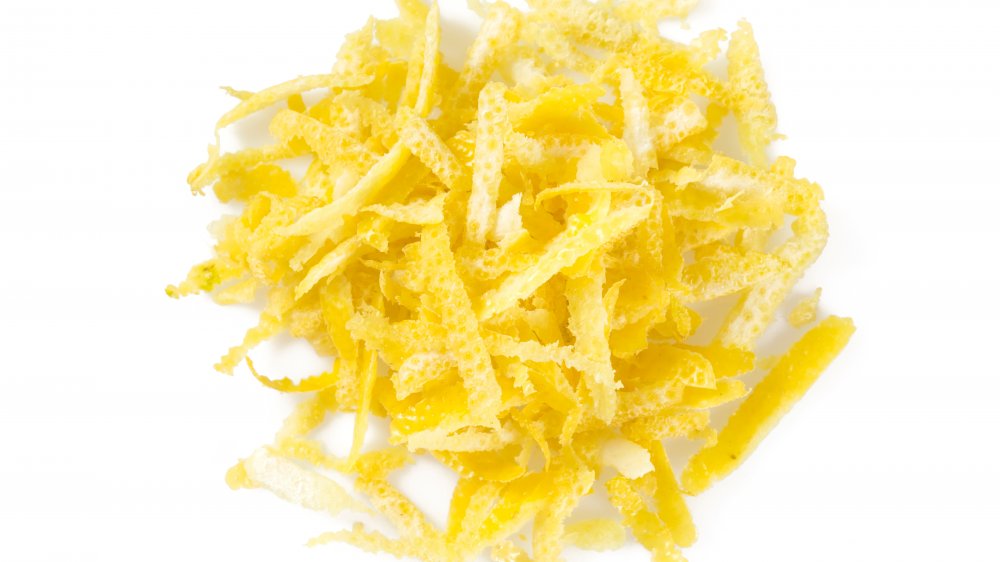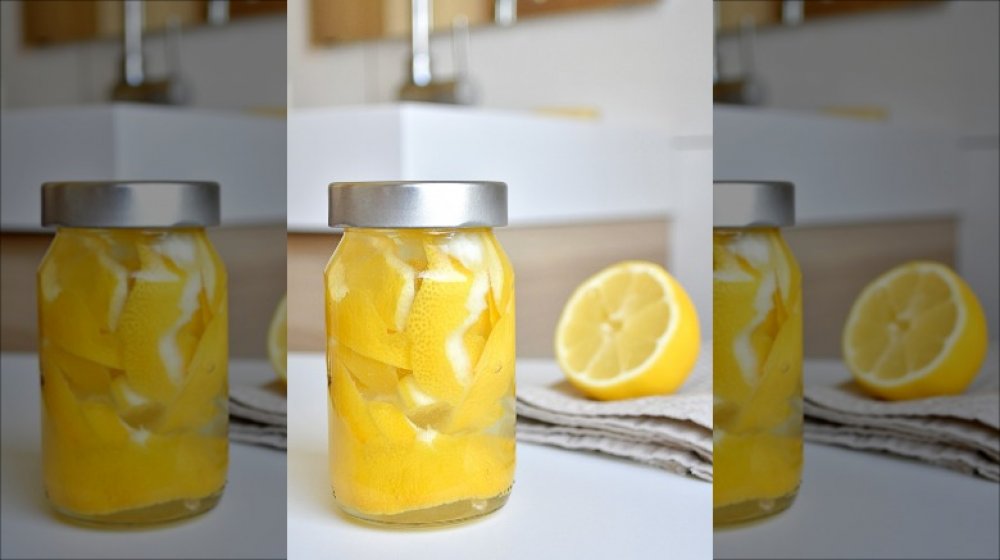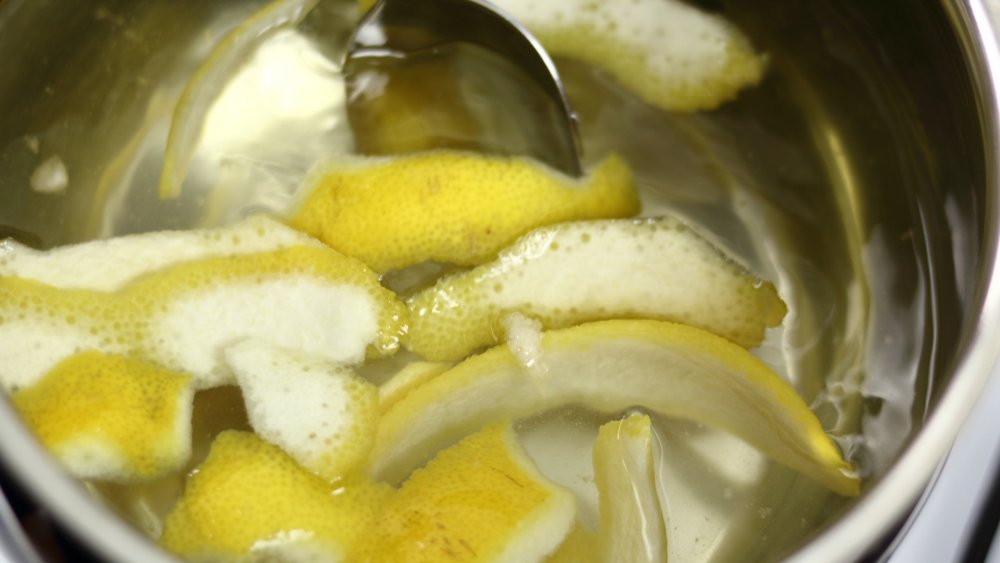You Should Save Your Lemon Peels. Here's Why
If you are just using lemons for their juice, you're missing out on all of the healthy (as well as fragrant, and delicious!) benefits that come along with putting the peel to good use. According to the Natasha's Kitchen food blog, it's the oils contained in lemon peel that make it so good for you. This oil can help with your digestion, and could boost your immune system. What's more, the D-limonene found in lemon peels even has possible cancer-fighting properties. The Memorial Sloan Kettering Cancer Center found anti-cancer effects in laboratory studies.
Aside from the health benefits, lemon oil also imparts a fresh, lemony scent and flavor without the sourness found in lemon juice. So, next time you squeeze a lemon, be sure to save that peel! You can either slice the peel off in strips using a vegetable peeler, or use a grater or zester — if you'll be using the lemon peel for culinary purposes, be sure to peel or grate only the yellow part, since the inner white layer of lemon peel can be bitter. If you won't be using the peel right away you can freeze it, or do as One Good Thing suggests and dry it.
Lemon zest can be used for cooking
Since lemon peel is quite nutritious— Healthline notes that 1 tablespoon of the stuff has 9 percent of recommended daily Vitamin C, as well as being high in fiber and containing calcium, potassium and magnesium — good thing there are so many ways to use it. For instance, 1 Million Women recommends using dehydrated lemon peel in tea, or else adding a pinch to your pepper grinder so you can make freshly-ground lemon pepper. Thank Your Body suggests that lemon peel can be candied or used to flavor sugar for baking, can be added to olive oil or butter, and can even be used to make DIY lemon extract. Twists of lemon peel can also be frozen into ice cubes to add a decorative and slightly citrusy touch to lemonade, iced tea, or cocktails.
Harness the cleaning power of citrus peel
Thank Your Body also lists numerous ways in which lemon peel can be used for household cleaning. Soaking lemon peels in white vinegar for two weeks makes a fresh-scented degreasing all-purpose cleanser, and a handful of lemon peels swirled in your coffee pot with a little ice and salt will help to clean out all its old coffee stains. If you toss a few lemon rinds in a bowl of water and microwave it on high for five minutes, the resulting condensation on the walls of your microwave can easily be wiped off, taking away the baked-on crud too, and leaving a nice lemony scent in its place.
Lemon peels even make a great metal polisher. Simply sprinkle salt over your tarnished knives, copper pots, or chrome kitchen fittings and then rub and scrub all the stains away with a lemon peel. Then just rinse, polish, and admire the restored shine!
Use lemon peels to freshen the air
One of the nicest things about lemon peels is the way they smell — and one of the best things about their scent is that it actually has the power to help drive away other, less-pleasant odors. DIY Natural suggests placing lemon peels beneath your garbage can liner, and replacing them every few weeks as needed to help keep your trash smelling less trashy. You can also burn lemon peels in your wood stove or fireplace to make your room smell like a (slightly smoky) lemon grove in Florida, or simmer them on the stove-top in a pot of water for a similar (though smoke-free) effect, should your house be without wood-burning capacities. One Good Thing mentions using dried lemon peel in potpourri, while Thank Your Body says dried peels can be used to make drawer sachets should you wish to have lemony-fresh socks and undies.
Lemon peel keeps the pests away
While lemon peel is very healthy and, well, ap-peel-ing, to humans, it has the opposite effect on other critters. Home Remedies for Life suggests that lemon peels, combined with lemon juice, make for an effective flea and tick repellent, and that lemon peels boiled in water may even be able to relieve the itch and pain of their bites. Thank Your Body offers the helpful info that ants hate lemon, so if you place lemon peel along your thresholds, windowsills, and any other entrances into your house, it will keep ants from crossing this barrier, since they apparently react to it the way vampires do to garlic.
Lemon is also not too popular with cats, so if you scatter lemon peel on top of the soil around your potted plants or in your garden, it will keep the kitties away. You can also use lemon peels to keep cats off counter tops or furniture, or spray some of that homemade lemon peel and vinegar household cleaning spray on rugs or in the doorways of rooms you want to keep feline-free.
Create lemon-scented beauty products
If you're a fan of kitchen cosmetics, you'll definitely want to keep some lemon peels on hand. DIY Natural says the white part of lemon rind contains enough acid to make an effective whitener if rubbed on your teeth, although warns against doing it too often since it might damage the enamel. They also recommend using lemon peels soaked in apple cider vinegar to make a hair conditioning rinse which can make your hair shinier, keep grease under control, and make your scalp feel healthier.
Healthline provides recipes for using lemon peel as a body scrub (chop finely, mix with sugar and olive oil), and an exfoliating face mask (dry, grind to a powder, and mix with rice flour and cold milk), while Thank Your Body suggests lemon peel can be rubbed directly on your face, then rinsed off, to make a skin toner. It can be used in a similar way to lighten age spots, and they also suggest sprinkling baking soda inside a half-lemon from which you've already squeezed out the juice, then sticking your elbow inside the lemon "cup" and twisting the lemon as if your elbow were a juicer. After doing this for a few minutes, you may feel a bit silly, but you should have much softer elbows, and they'll smell really nice, too.





